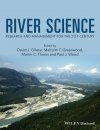About this book
River science is a rapidly developing interdisciplinary field at the interface of the natural sciences, engineering and socio-political sciences. It recognises that the sustainable management of contemporary rivers will increasingly require new ways of characterising them to enable engagement with the diverse range of stakeholders.
River Science represents the outcome of research by many of the authors and their colleagues over the last 40 years and demonstrates the integral role that river science now plays in underpinning our understanding of the functioning of natural ecosystems, and how societal demands and historic changes have affected these systems. River Science will inform academics, policy makers and society in general of the benefits of healthy functioning riverine systems, and will increase awareness of the wide range of ecosystem goods and services they provide.
Contents
List of contributors, ix
Preface, xiii
Ken J. Gregory
1 An introduction to river science: research and applications, 1
Martin C. Thoms, David J. Gilvear, Malcolm T. Greenwood and Paul J. Wood
Part 1 Fundamental principles of river science
2 An ecosystem framework for river science and management, 15
Michael D. Delong and Martin C. Thoms
3 Fine sediment transport and management, 37
Desmond E. Walling and Adrian L. Collins
4 Linking the past to the present: the use of palaeoenvironmental data for establishing reference conditions for the Water Framework Directive, 61
Ian Foster and Malcolm T. Greenwood
5 Achieving the aquatic ecosystem perspective: integrating interdisciplinary approaches to describe instream ecohydraulic processes, 84
John M. Nestler, Claudio Baigún and Ian Maddock
6 Measuring spatial patterns in floodplains: A step towards understanding the complexity of floodplain ecosystems, 103
Murray Scown, Martin C. Thoms and Nathan R. De Jager
7 Trees, wood and river morphodynamics: results from 15 years research on the Tagliamento River, Italy, 132
Angela M. Gurnell
8 The Milner and Petts (1994) conceptual model of community structure within glacier-fed rivers: 20 years on, 156
Alexander M. Milner
9 Remote sensing: mapping natural and managed river corridors from the micro to the network scale, 171
David J. Gilvear, Peter Hunter and Michael Stewardson
10 Monitoring the resilience of rivers as social–ecological systems: a paradigm shift for river assessment in the twenty-first century, 197
Melissa Parsons, Martin C. Thoms, Joseph Flotemersch and Michael Reid
Part 2 Contemporary river science
11 Faunal response to fine sediment deposition in urban rivers, 223
Paul J. Wood, Patrick D. Armitage, Matthew J. Hill, Kate L. Mathers and Jonathan Millett
12 Characterising riverine landscapes; history, application and future challenges, 239
Victoria S. Milner, David J. Gilvear and Martin C. Thoms
13 Thermal diversity and the phenology of floodplain aquatic biota, 259
Jack A. Stanford, Michelle L. Anderson, Brian L. Reid, Samantha D. Chilcote and Thomas S. Bansak
14 Microthermal variability in a Welsh upland stream, 279
Laura Gangi, David M. Hannah and Markus Weiler
15 River resource management and the effects of changing landscapes and climate, 295
James A. Gore, James Banning and Andrew F. Casper
16 River restoration: from site-specific rehabilitation design towards ecosystem-based approaches, 313
Jenny Mant, Andy Large and Malcolm Newson
17 Ecosystem services of streams and rivers, 335
J. Alan Yeakley, David Ervin, Heejun Chang, Elise F. Granek, Veronica Dujon,Vivek Shandas and Darrell Brown
18 Managing rivers in a changing climate, 353
Robert L. Wilby
19 Conclusion: The discipline of river science, 372
David J. Gilvear, Malcolm T. Greenwood, Martin C. Thoms and Paul J. Wood
Index, 379
Customer Reviews
Biography
David Gilvear is a Professor of River Science at the University of Plymouth, UK. His river research has been at the hydrology, geomorphology and ecology interface within a geographically-led space-time framework – inspired by his PhD supervisor, Professor Petts. The majority of research has been in response to catchment specific, national or global issues in river management and as such he has worked with industry, environmental bodies and regulatory authorities.
Malcolm Greenwood is an ecologist, with a special interest in entomology, and is now retired from Loughborough University. He has worked closely with Professor Petts over many years, bringing together the biological principles appropriate to our understanding of contemporary and palaeo river systems, including the changes brought about by river engineering and management practices.
Martin Thoms is a Professor of River Science at the University of New England, Armidale, Australia. He believes the most exciting research is undertaken at boundaries the boundaries between different disciplines, the science-management-policy boundary and the boundaries between rivers and their floodplains. His research in this domain has occurred in both national and international settings.
Paul Wood is Professor of Ecohydrology at Loughborough University, UK. His research encompasses the disciplines of hydrology, ecology, geomorphology and environmental management to address contemporary questions in River Science. His research is centred on environmental flows and the effects of disturbances in surface and groundwater dominated systems.



































